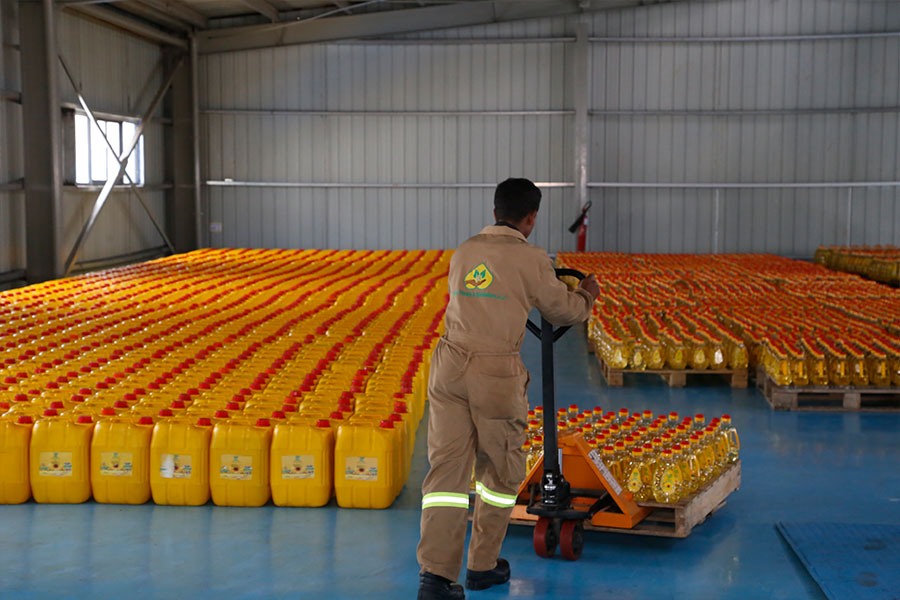
Fortune News | Jul 08,2023
Ethiopia has taken a step to integrate refugees and asylum seekers into its formal economy with a new directive aimed at unlocking employment opportunities for over a million displaced individuals. The directive grants refugees the right to engage in diverse commercial activities, including agriculture, industry, and small enterprises, while restrictions remain on sectors such as border trade, security, and government jobs.
Issued under the 2019 Refugee Proclamation, the directive was signed by Teyiba Hassen, Director General of the Refugees & Returnees Service (RRS), and has been welcomed by international humanitarian organisations as a vital measure to support refugee self-reliance. It sets a clear framework to implement the right to work, which has long been promised under Ethiopia’s refugee policies.
To participate in the labour market, refugees must obtain a work permit from the Ministry of Labor & Skills. The annual renewable permit requires the submission of a personal history form, an identification document from the RRS, and a photograph. According to Dejene Bekele, head of employment promotion at the Ministry, over 8,000 refugees secured work permits in the past fiscal year. He pointed out that work permit issuance has been delegated to the RRS due to the Ministry’s limited branch access near refugee camps.
Ethiopia is currently home to over 1.1 million refugees and asylum seekers, primarily from South Sudan, Somalia, and Eritrea, making it the third-largest refugee-hosting country in Africa. Gambela Regional State hosts the largest portion at 37pc, followed by the Somali Region at 33pc, and the Benishangul-Gumuz Region at 10pc.
The recently launched National ID program has extended its services to refugees, improving their access to national services. This initiative began in Addis Abeba, with Ethiopia pledging to incorporate 814,000 refugees into the system during the 2023 Global Refugee Forum.
“These will grant access to government-directed services,” Teyiba said, underscoring the significance of this inclusion for refugee populations.
However, Hassen Shamseddin, head of legal services at RRS, accentuated that the directive’s implementation remains limited to refugee camps. He further noted that around 77pc of Ethiopia’s refugee population still lives in camps, often in remote areas with limited amenities.
In a bid to protect the local labour market, the directive restricts refugees from working in more than one sector.
“Allowing refugees to work across multiple sectors could overwhelm the national workforce,” Hassen said. He also pointed out that many refugees had been working informally, often without legal recognition, contributing to local economies in a limited capacity.
"By formalising their businesses, they can now contribute to tax revenues," Hassen told Fortune, underscoring the broader economic implications of integrating refugees into the formal workforce.
Despite the progress, refugees in Ethiopia have long faced hurdles in securing employment due to restrictive regulations. Work permits were previously challenging to obtain, with applicants required to demonstrate expertise in high-demand areas. Globally, 90pc of refugees rely on humanitarian aid, with 83pc hosted in developing countries like Ethiopia.
Akalu Petros, communication director at the Ministry of Revenues, acknowledged the directive's potential to increase the tax base. He noted that some refugees had already been paying taxes before the directive through their existing work permits.
"This brings additional employment opportunities, revenue, and development,” he said.
Experts emphasise the importance of collaboration with development partners and the private sector. Minilik Assefa, a refugee law expert, cautioned that the implementation of the directive must be handled carefully to prevent the rise of anti-refugee sentiment within host communities.
“Taking lessons from other countries' experiences are important," he said. "Job creation efforts should benefit both refugees and locals.”
While the 2019 Proclamation was hailed as progressive, the initial directive left 99pc of refugees unable to access employment opportunities, forcing many to partner with local citizens to obtain business licenses, often exposing them to exploitation and scams. Minilik noted that the success of the new directive would depend on balancing refugee rights with protections for the national labour market.
Eptisam Khaled, a Yemeni refugee who has lived in Addis Abeba for nine years, shared her struggles with bureaucracy while trying to start a small coffee business in Merkato. After finally securing a national ID and business license, she has faced ongoing challenges. She hoped it would help with the continued hardships refugees face even as policies begin to change in their favour.
“Government institutions don’t recognize us easily,” Eptisam explained, noting that despite some support from the UNDP, sustaining her business and raising three children has been difficult.
PUBLISHED ON
Sep 08,2024 [ VOL
25 , NO
1271]

Fortune News | Jul 08,2023

Viewpoints | Sep 08,2024

Commentaries | Apr 01,2023

Fortune News | Jul 30,2022

Fortune News | Mar 16,2019

Commentaries | Aug 18,2024

Radar | Aug 13,2022

Fortune News | Aug 04,2024

Radar | Oct 20,2024

Commentaries | Jan 14,2023

Dec 22 , 2024 . By TIZITA SHEWAFERAW
Charged with transforming colossal state-owned enterprises into modern and competitiv...

Aug 18 , 2024 . By AKSAH ITALO
Although predictable Yonas Zerihun's job in the ride-hailing service is not immune to...

Jul 28 , 2024 . By TIZITA SHEWAFERAW
Unhabitual, perhaps too many, Samuel Gebreyohannes, 38, used to occasionally enjoy a couple of beers at breakfast. However, he recently swit...

Jul 13 , 2024 . By AKSAH ITALO
Investors who rely on tractors, trucks, and field vehicles for commuting, transporting commodities, and f...

Nov 1 , 2025
The National Bank of Ethiopia (NBE) issued a statement two weeks ago that appeared to...

Oct 25 , 2025
The regulatory machinery is on overdrive. In only two years, no fewer than 35 new pro...

Oct 18 , 2025
The political establishment, notably the ruling party and its top brass, has become p...

Oct 11 , 2025
Ladislas Farago, a roving Associated Press (AP) correspondent, arrived in Ethiopia in...